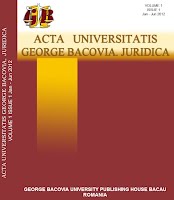Izvoarele dreptului pentru judecătorul naţional. Câteva remarci privind România
The sources of law applied by the national judge. Remarks regarding Romania
Author(s): Genoveva VrabieSubject(s): Law, Constitution, Jurisprudence
Published by: Editura Universităţii George Bacovia din Bacău România
Keywords: sources of law; the hierarchy of the sources of law; the supremacy of the Constitution; European legal norms
Summary/Abstract: During the period of the Romanian socialist organization of state, the theoreticians of law used to analyze and rank the sources of law, in descending order, starting with the Constitution and ending with the normative acts adopted by local government bodies. After adopting the Constitution in December 1991, the theory of law manuals or the monographs dedicated to the sources of law approached this issue in an approximately similar manner with slight differences, the Constitution being considered the supreme source of law. Considering that the treaties ratified by the Parliament were part of the domestic law, according to art. 11 of the Constitution, the issue of integrating them in the hierarchy of the sources of law appeared, as did the problem of international regulations regarding the human rights which, according to art.20 paragraph 2, have priority when any inconsistencies exist between treaties, pacts, etc. and internal laws. The hierarchization of the sources of law became more complex after the revision of the Constitution in 2003, when the priority of the E.U. treaties was expressly stipulated, as well as of the legally binding Community regulations in case they should come in conflict with the internal laws. Moreover, the hierarchization of the sources of law became even more complex after Romania’s accession to the European Union. Provided that the judge has to choose between European and internal laws, between an interpretation given by the Constitutional Court and one given by the High Court of Cassation and Justice, or between an interpretation given by a national court and one provided by an European court, the tasks of the national judge are becoming more and more difficult. However, they are not insurmountable. The effort made at the national as well as at the European level has paid off. In practice, several solutions have been found. The theory, however, has got some more steps to go.
Journal: Acta Universitatis George Bacovia. Juridica
- Issue Year: I/2012
- Issue No: 2
- Page Range: 59-72
- Page Count: 14
- Language: English

